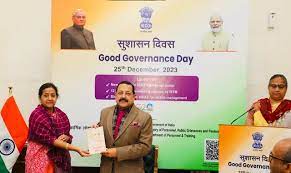Mission Karmyogi : Extension

On Good Governance Day, Union Minister Dr Jitendra Singh launched the Extended Version of Mission Karmayogi in New Delhi.
- My iGOT Delivers targeted training courses on the home page of individual officers, addressing their unique capacity-building needs as identified in the Capacity-Building Plan for their Ministries/Departments.
- This ensures a highly personalized, focused, and targeted capacity-building experience, aligning individual and organizational learning needs.
- Blended Programs Facilitates equitable access to training methodologies across all levels, meeting dynamic training needs.
Integrates traditional offline (in-person) classroom courses with online learning components, allowing officers and faculty to benefit from the flexibility and convenience of online courses while retaining the invaluable benefits of face-to-face classroom interactions. - Curated Programs Designed to cater to diverse learning needs of Ministries/Departments and Training Institutions.
- Course Providers can curate relevant content, resources, and assessments from the iGOT repository with a Programmatic approach, providing a tailored learning journey.
- 12 Domain-Specific Capacity Building E-learning Courses Developed in two months as part of the Annual Capacity Building Plan (ACBP) of the DOPT by Karmayogi Digital Learning Lab (KDLL) of DoPT.
- These 12 courses directly address the domain competency requirements of Civil Servants working in DoPT and assist other Government organizations in handling functional matters effectively on a day-to-day basis.
- VIKAS (Variable & Immersive Karmayogi Advanced Support) A new blended learning program for capacity-building of middle management civil servants in the Central Secretariat.
- VIKAS is a blended program with iGOT, consisting of 33 hours complemented by 30 hours of offline training at ISTM.
- It focuses on the development of functional, behavioral, and technological competencies required in the Central Government.
Mission Karmayogi:
- It is a mission aimed to transition civil services from ‘Rules based’ to ‘Roles based’ Human Resource (HR) Management by aligning work allocation of civil servants by matching their competencies to the requirements of the post, thereby leading to “an effective citizen-centric civil service”




